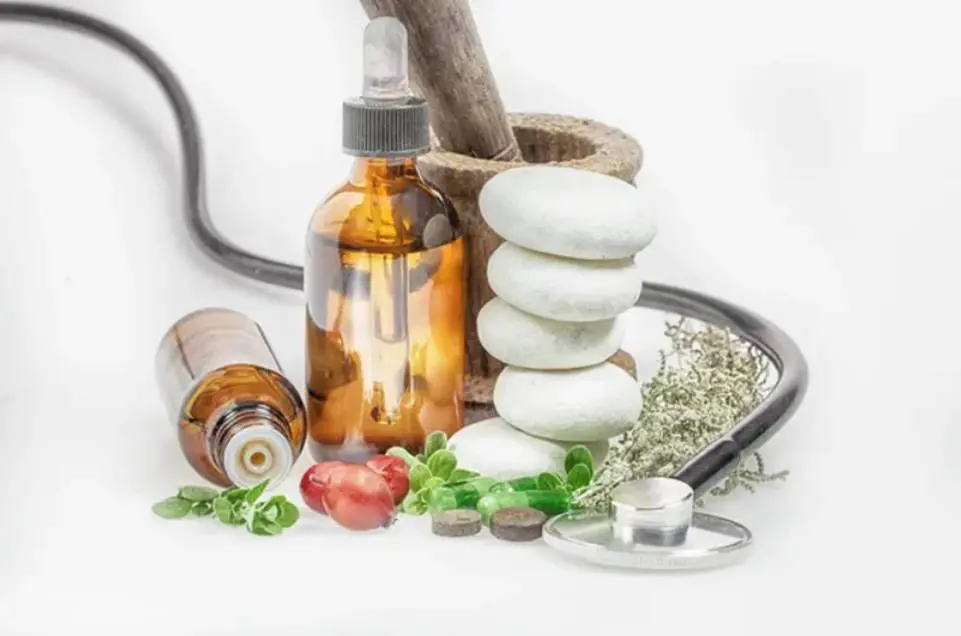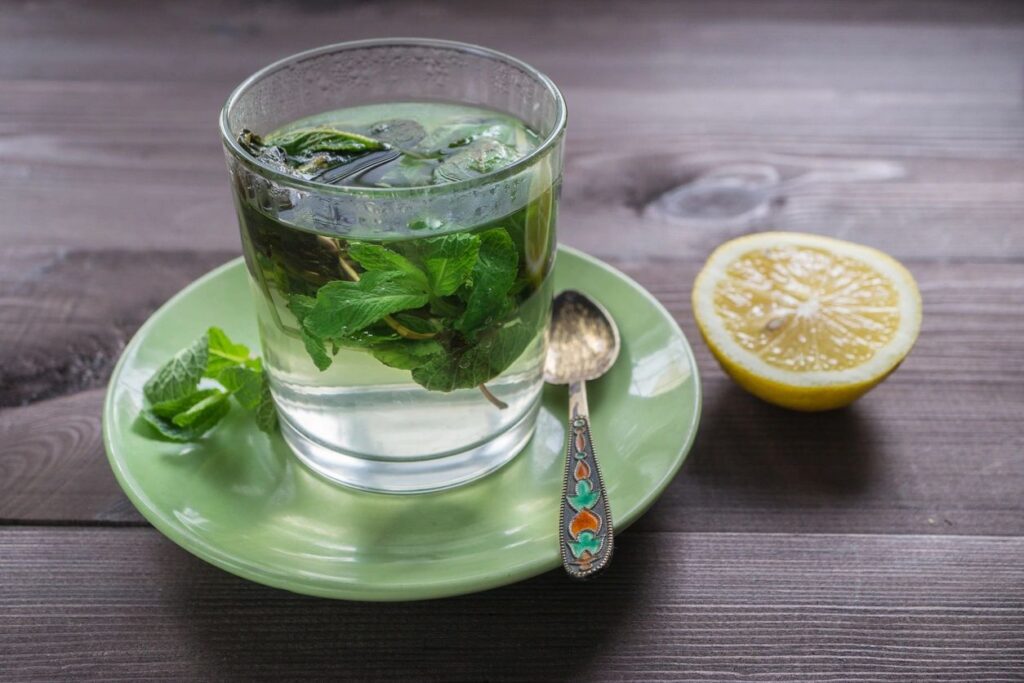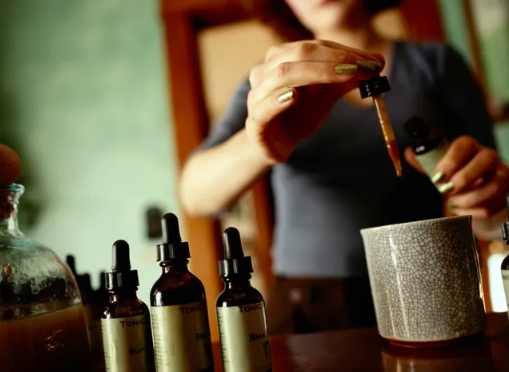
Naturopathy
Do you believe in the power of nature? Naturopathic practitioners sure do, and so do we!
Natural remedies have been around for centuries, and millions of people are turning to them again. Enter infused drinkables, tinctures, extracts, edibles, and chewables. These products can be infused with natural ingredients to provide health benefits for your body and mind.
The best part is that there are countless ways to infuse your favorite drinks and snacks with natural goodness. From herbs and fruits to flowers and roots, you’re definitely spoilt for choice.
Tinctures are herbal extracts that can be consumed directly or added to drinks, for example. You can also use them as a natural flavoring agent to enhance your food.
On the other hand, extracts are a more concentrated form of tinctures, often used for medicinal purposes. Edibles and chewables are infused with herbs, adaptogens, and other natural ingredients. They can help with digestion, anxiety, and sleep.
However, there’s more to know than their basic descriptions. Plus, knowing the differences can help you choose the right treatment for you. So, get ready to discover the wonders of naturopathy that can help you feel your best.
What is Naturopathy?
Naturopathy is a holistic approach to health and wellness. Instead of relying on chemicals and “traditional” medicine, it uses natural remedies.
The reasoning behind natural treatments is that naturopaths believe the human body can heal itself. However, it needs the right tools and support to do so.
Moreover, they believe in treating the whole person. This is different from traditional medicine, which treats individual symptoms or conditions. These ideas come from the principles of vitalism, which means the body has an innate ability to maintain balance.
Naturopaths use a variety of treatments, including:
- Herbal remedies
- Supplements
- Dietary changes
- Lifestyle modifications
The goal? To help the body heal and stay healthy.
One of the key principles of naturopathy is that prevention is the best medicine. That’s why naturopaths focus on promoting healthy habits and preventing disease before it occurs.
They also believe in the power of the mind-body connection. It’s why they often incorporate mind-body practices like meditation and yoga into their treatment plans.
You can use naturopathy independently. However, naturopathy is often used as a complementary approach to conventional medicine. Naturopaths work closely with other healthcare providers to create a comprehensive treatment plan for each patient. They may also work with patients to help them reduce their reliance on prescription medications.
Benefits of Naturopathy
Naturopathy is safe and effective for treating a wide range of health conditions. It provides benefits that traditional medicine can’t offer. Let’s take a closer look at some of these benefits.
Holistic Treatment
Naturopathic doctors will consider all aspects of the patient’s well-being, including:
- Physical
- Mental
- Emotional health
By addressing the underlying cause of the disease, naturopathy provides long-term benefits. The best part? They don’t require you to invest in chemicals or costly medical treatments.
Natural Remedies
Naturopathy uses natural remedies such as herbs, vitamins, minerals, and nutritional supplements to treat illnesses. Practicioners extract these remedies from plants and other natural sources. This makes them safe and effective without any toxic side effects that prescription drugs often have.
Personalized Treatment
As mentioned, naturopathic doctors take a personalized approach to treatment. They work with each patient to determine the best course of action. They do so only after assessing your unique needs and circumstances. This ensures the treatment is custom-made, providing more effective treatment and faster healing times.
Natural Healing Products
From infused drinkables to tinctures and extracts, there is something for everyone seeking a more holistic approach to wellness. One area of interest in natural healing products is those made with cannabis.
Despite the (unfortunate) stigma surrounding cannabis, it has numerous medicinal and therapeutic benefits. This is why it’s important to explore cannabis-based products and how they can benefit those seeking a more natural approach to healing.
Whether you’re dealing with anxiety, chronic pain, or inflammation, there’s a natural remedy out there that can help. And we’re here to help you find it.
D9 THC
D9 THC, or Delta-9 Tetrahydrocannabinol, is a natural ingredient found in cannabis plants. It’s what you’ll find sold in medical marijuana dispensaries across the country. Unlike CBD, which doesn’t make you feel high, D9 THC is what makes people feel high when they use marijuana.
So, how does it help in natural treatments? D9 THC has been found to have several helpful effects, such as:
- Pain and anxiety relief
- Nausea reduction
- Appetite stimulation
It connects to specific spots in the brain and nervous system called cannabinoid receptors, which are part of the endocannabinoid system. This system helps control different functions in our bodies, like our moods, sleep, and how we feel pain.
D8 THC
D8 THC is a buzz-worthy extract derived from the hemp plant that’s becoming a big name in naturopathic treatment. It’s like THC but with a more mellow vibe that’s perfect for taking the edge off anxiety and stress. More importantly, Delta 8 THC is currently legal in most states, making it easier to find.
What’s cool about D8 THC is that it’s less potent than traditional THC, making it great for people who don’t want to feel super high. Like “regular” psychoactive cannabis, D8 THC can be consumed in various forms, from tinctures to edibles and more.
THCA
THCA is the most abundant ingredient found in cannabis plants. Also known as tetrahydrocannabinolic acid, it turns into THC, the part of marijuana that makes you feel “high” when it’s heated.
But, unlike THC, THCA doesn’t make you feel that different if consumed naturally on its own. Instead, it can help reduce swelling, prevent sickness, and protect nerve cells. This makes it a possible treatment for things like feeling sick, joint pain, and seizures.
THCP
THCP, or tetrahydrocannabiphorol, is a relatively new addition to the world of naturopathic health. It’s a potent, yep, you guessed it, cannabinoid that is believed to be over 30 times more effective than the more commonly known THC.
THCP works by binding to the CB1 receptor in the brain. When consumed, it can lead to feelings of relaxation, pain relief, and even euphoria. As part of naturopathic treatment, THCP can help manage various physical and mental health conditions, including:
- Anxiety
- Depression
- Chronic pain
- Inflammation
However, it works best when you integrate it into a healthy diet and lifestyle.
Live Rosin
Made from fresh cannabis flowers, live rosin resinous substance rich in terpenes and cannabinoids. The extraction process is slightly different than other forms of cannabis.
An expert will extract live rosin using heat and pressure without solvents or chemicals. This makes it a clean and safe option for health-conscious individuals.
When consumed as part of naturopathic treatment, live rosin can provide relief for a variety of ailments, such as:
- Pain
- Inflammation
- Anxiety
- Insomnia
Plus, it’s easy to use – vaporize it and inhale the vapor.
Hemp
Hemp is a type of plant used for centuries for its medicinal properties. It’s part of the cannabis family but doesn’t have the same psychoactive effects as marijuana. Instead, it contains a beneficial compound called cannabidiol (which you likely by now know as CBD) that can help with pain, anxiety, and inflammation.
CBD
CBD is yet another compound found in the cannabis plant with numerous benefits for overall health and wellness. Unlike THC, CBD does not produce a high and is non-addictive. CBD has been shown to:
- Alleviate symptoms of anxiety and depression
- Reduce inflammation and pain
- Improve sleep quality
Many people use CBD as a natural alternative to prescription drugs for these conditions. Moreover, CBD is available in various forms, such as oils, tinctures, edibles, and topicals. This makes it a versatile option depending on your ailment.
Speaking of the various forms of naturopathic solutions, let’s explore the most popular ways to consume the natural plants and remedies mentioned above.
Chewables

Chewables have become an increasingly popular way for people to consume natural remedies. They’re essentially edibles that require chewing to break down and release the active ingredients. Chewables can come in various forms and are often made with all-natural ingredients that promote overall wellness.
One of the key benefits of chewables is their ease of use. They can be taken on the go and do not require water for consumption. This makes them convenient for busy individuals who want to incorporate natural remedies into their lifestyles. Additionally, they are often (deliciously) flavored, making them more palatable and enjoyable to consume.
Chewables can contain a range of natural ingredients that promote health and wellness. For example, echinacea and elderberry are commonly used in chewables to support the immune system. Other popular ingredients include ginger, turmeric, and chamomile, which reduce inflammation and promote relaxation.
But that’s not all; there are many other natural ingredients that can be used in chewables, each with its unique health benefits.
Several examples of chewables in the world of naturopathic products include the following. Here are a few examples to help provide some context of what’s out there and what to look for if you’re interested in incorporating chewable into a holistic health routine.
Elderberry Gummies
Often used as a natural remedy for cold and flu symptoms, elderberry is a great ingredient for chewables. Elderberry gummies have become increasingly popular over the years due to their ability to support and strengthen the immune system.
CBD Chews
CBD has been gaining mainstream popularity for its potential health benefits. CBD chews are a convenient way to incorporate this natural compound into your daily routine.
Melatonin Gummies
Sleep is essential to overall wellness, and melatonin is a popular ingredient to promote better sleep. Melatonin gummies are a natural and effective way to aid in sleep support. Plus, they usually taste great.
Drinkables

These easy-to-consume liquids are created by combining natural ingredients with liquids like water or alcohol to extract their beneficial properties. With drinkables, you can enjoy the health benefits of your favorite natural ingredients in a convenient and delicious form.
Like other naturopathic food and drink, they contain natural ingredients such as herbs, fruit, vegetables, and other plant-based components that benefit the body. For example, some drinkables are known to:
- Help with digestion
- Boost the immune system
- Reduce inflammation
- Improve mental clarity
The ingredients in naturopathic drinkables are carefully selected to provide the most benefits to the body.
For example, adaptogens like ashwagandha and holy basil reduce stress and enhance mental clarity. Turmeric, ginger, and boswellia help reduce inflammation, while chamomile and valerian roots enhance sleep quality and alleviate anxiety.
All ingredients are natural, organic, and free from harmful chemicals or artificial colors. And while the most common types of drinkables in a naturopathic store are typically teas, cannabis drinkables are becoming more widely available for those interested in a more “potent” liquid.
CBD-Infused Beverages
One popular drinkable is the CBD-infused beverage. These health-boosting drinks are available in different flavors and forms, including tea, coffee, and energy drinks.
THC-Infused Beverages
As mentioned, the THC-infused beverage is another kind of drinkable that has gained popularity in recent years. THC is the compound in cannabis that gives a person a “high.”
THC drinkables are popular among those who want to experience the psychoactive effects of marijuana without smoking it. These products are available in different flavors and strengths. As with other THC products, if you plan on consuming them, ensure you know the dosage and start slow.
Edibles

Edibles are a naturopathic product that can come in fun, delicious forms, from cupcakes and cookies to gummies, chocolates, marshmallows, and more. They’re typically infused with natural ingredients and medicinal herbs, mostly cannabis, making them popular for those seeking a natural alternative to traditional medicine.
THC Edibles
THC edibles come in many forms, including baked goods, candies, chocolates, and beverages. One popular example is gummies, which are infused with THC to provide a sweet, discreet way to consume cannabis. They come in various flavors and strengths and are popular for those seeking a milder, more controllable high.
Another example is chocolate, which is often infused with THC to provide a luxurious, indulgent treat that also offers the therapeutic benefits of cannabis.
When choosing the right THC edibles (or any type of edible, really), the goal is to choose one that’s easy to dose. Sometimes, cakes and larger edibles are harder to dose. Gummies that come in little portions are much easier to dose if you want to control your high and enjoy the therapeutic benefits without going overboard.
Our point? Pay attention to edible dosage. It’s the only way to ensure you get what you need from the edible.
Hemp Edibles
Hemp edibles also come in various forms, including protein bars, energy bites, and gummies, but contain CBD rather than THC. As you (hopefully) learned above, CBD is known for reducing inflammation, improving mood and sleep quality, and supporting overall physical and mental health.
EXTRACTS

Extracts are integral to naturopathic medicine. They encompass various ingredients, such as:
- Plants
- Fruits,
- Herbs
They’re made by extracting nutrient-rich compounds from the source material. Then, they get concentrated in a liquid form.
Herbal Extracts
One of the most popular types of extracts is herbal extracts. These extracts are created by steeping dried herbs in alcohol or glycerin. This helps extract the plant’s active constituents.
This process creates a concentrated liquid that can be used in various ways. The most common methods include topical applications, teas, and tinctures.
Fruit Extracts
Fruit extracts are made using a process similar to herbal extracts but with fruits like berries and citrus. They’re also rich in antioxidants and other powerful nutrients. It’s part of what makes them great for boosting immune function and preventing chronic diseases.
Mushroom Extracts
Mushroom extracts are also becoming increasingly popular in the naturopathic world. They feature active compounds from medicinal mushrooms like reishi and chaga. When consumed, these extracts can help to boost immune function and reduce inflammation throughout the body.
Plant Extracts
Finally, plant extracts are another important type of extract used in naturopathic medicine. These extracts use various plants, including:
- Roots
- Bark
- Leaves
Some common plant extracts include chamomile, echinacea, and ginger. They’re all well-known for their healing properties.
Infused Products

Infused products work with the body, rather than against it, to provide a natural and effective remedy for common ailments. For example, chamomile-infused tea is known to help with insomnia and anxiety, while peppermint-infused capsules may aid digestion.
The production process is similar to the other naturopathy treatments on this list. Experts infuse natural ingredients like herbs, fruits, and flowers into a liquid such as oils or alcohol. They then use those liquids to create various drinkables, tinctures, extracts, edibles, and chewables that deliver the benefits of the infused ingredients.
Basically, infused products are the base for most consumable treatments you’ll find today. With different blends for different needs, infused products offer a personalized approach to healing, allowing individuals to target specific health concerns. This is especially true of infused THC products.
TINCTURES

Finally, we have tinctures. Tinctures are concentrated herbal extracts used for centuries in natural medicine. They’re made by steeping plant material, such as roots, leaves, or flowers, in alcohol or vinegar. The liquid extracts the active compounds from the plants, producing a potent remedy that can be taken orally.
Tinctures have many benefits, including quick absorption, easy use, and longer shelf life than fresh herbs. They also allow precise dosing, which is ideal for managing specific health conditions or symptoms. Naturopathic practitioners often use tinctures as part of holistic treatments for various ailments, from digestive problems to anxiety and depression.
If you’re interested in using tinctures, it’s helpful to familiarize yourself with the different types of tinctures available.
Alcohol-Based Tinctures
Alcohol-based tinctures are the most common type of tincture. They’re made by soaking herbs in high-proof alcohol for several weeks. The alcohol extracts the beneficial compounds from the herbs, creating a concentrated liquid extract.
Glycerin-Based Tinctures
Glycerin-based tinctures are a great alternative for those who prefer a non-alcoholic option. Glycerin is a natural sweetener that can extract beneficial compounds from herbs. These tinctures are often used for children, pregnant women, and those who don’t consume alcohol.
Vinegar-Based Tinctures
Vinegar-based tinctures are made by soaking herbs in apple cider vinegar for several weeks. They offer many of the same benefits as alcohol-based tinctures but have a sour taste.
Oil-Based Tinctures
Oil-based tinctures are made by infusing herbs in oil, such as olive oil or coconut oil. They are often used for topical applications like massage or skin care. However, you can also add them to food or beverages to help heal internal ailments.
How to Choose the Best Naturopathy Treatments
Are you interested in trying out naturopathy treatments? With the abundance of options available (as you can see above), how do you choose the best naturopathy treatment?
Firstly, it’s important to research the different naturopathy treatments available.
Infused drinkables, tinctures, extracts, edibles, and chewables are some options available. Each option has unique benefits and is designed to treat different ailments. Knowing which treatment is most appropriate for your ailment is crucial.
Another important factor to consider when choosing a naturopathy treatment is the quality of the product. Buy herbal remedies from reputable sources. This guarantees you’ll receive high-quality, safe products free from harmful chemicals.
Then, consider the dosage of the treatment. You want to ensure you’re taking the recommended dosage for your age and body type and not exceeding it. While you can’t “overdose” on cannabis products, you can take too much of a good thing. Plus, some herbs and plants are toxic when consumed in large quantities.
Our most important tip, though, is to consult a qualified naturopathic practitioner. They can help you identify the underlying cause of your ailment and recommend the best naturopathy treatment suitable for you.
Learn More About Health & Wellness
Interested in learning more about naturopathy? Want the latest updates regarding chewables, drinkables, and other remedies? Sign up for our health and wellness newsletter to receive up-to-date information!
Or, continue to browse other articles and guides. We cover everything from medical conditions and lifestyle changes to naturopathy topics and more. If you’re interested in something we haven’t covered, contact us to let us know.
